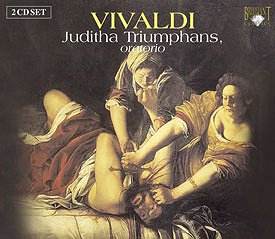Written
in 1716 for the girls of the Ospedele della Pietà this
is the only surviving Vivaldi oratorio. Whilst the vocal forces
were naturally circumscribed as an all female solo group it’s
possible there were tenors and basses in the chorus – possibly
comprised of teachers. It’s not the Chorus, however, that is the
glory of the writing of Juditha triumphans – that belongs
to the orchestra, which must have been one of the most precociously
talented and virtuosic bands in all Italy given Vivaldi’s confidence
in giving opportunities of glamorous extravagance and felicity
to solo players. The work is scored to include recorders, oboes,
chalumeaux, trumpets, mandolin, theorboes, viola d’amore and splendid
opportunities abound for solo strings and continuo.
The
"Sacred military oratorio" is a thinly veiled allegory
of the contemporary politico-military tensions that existed at
the time of the composition of the work. The biblical characters
depicted have their counterparts in the map of the times; the
Venetian Adriatic is Juditha herself, Holofernes represents the
Turkish Emperor and so on. The clash between the Venetian and
Ottoman worlds has its concentrated essence simplified and reduced
in this oratorio of defiance and self-assertion, greatly larded
by elements of self-justification.
It’s
a rather uneven work; magnificent in parts, less inspired elsewhere.
One of the major weaknesses is the role of the Chorus, which is
under-developed and rather short-winded. The arias are uneven
and there is a definable lack of "personality" throughout
the work as well as an unconvincing psychology, which is mirrored
and exacerbated by a lack of differentiation and characterisation.
Few arias reach the dazzling heights of Veni, veni me Sequere
fida but given the many opportunities elsewhere for colour
and orchestral drama one can always find moments of ear titillating
delight.
Dating
from 1990 this McGegan led performance was in the vanguard of
the re-establishment of the work. Now of course we have the Opus
111 three CD set (this McGegan is on 2 CDs) with Magdelena Kožena
in the title role, a well-received traversal led by Alessandro
de Marchi. The singers for McGegan are without exception vibrantly
voiced and strongly engaged. Gloria Banditelli has an excellent
voice with effortless production though once or twice she succumbs
to a degree of by rote singing. As Holofernes, Judit Németh
is a worthy adversary, intelligent and expressive and always theatrically
involving. Mária Zádori as Abra is not always dead
centre of the note but she is otherwise a technically impressive
performer and Annette Markert makes a good showing as Holofernes’
servant Vagaus. There are numerous points of delicacy and interest
from Juditha’s aria Transit aetas – so colourful and sensuous
– and her florid coloratura in Vivat in pacem to Abra’s
evanescent and lighthearted Non its reducem. The fine
orchestra has its chance in Si fulgida per te where its
accompaniment to Abra’s aria is simply delicious, but there are
times when it seems McGegan indulges them too pleasurably at the
expense of internal dramatic tension.
The
booklet sets the scene and there is the full Latin text but with
no translations. Brilliant Classics are extremely inexpensive
and this is a generally recommendable set, though it is maybe
more "work in progress" than finished article.
Jonathan
Woolf
